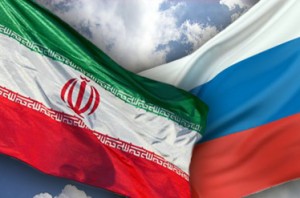 Moscow will purchase poultry, fish and shrimp from Iran as an alternative source to avoid the deficit growing from Europe's sanction policy and Russia's countermeasures. Iran has agreed to supply oil in exchange for Russian goods, including grain.
Moscow will purchase poultry, fish and shrimp from Iran as an alternative source to avoid the deficit growing from Europe's sanction policy and Russia's countermeasures. Iran has agreed to supply oil in exchange for Russian goods, including grain.MOSCOW, December 17 (Sputnik) � Russia intends to�start importing poultry from�Iran and increase the import of�fish and shrimp from�the country, Russian trade representative in�Iran Andrei Lugansky told RIA Novosti in�an interview.
"Iran at�some point carried out�a state program on�the construction of�poultry farms, which is why this country can import in�Russia a big amount of�chicken," Lugansky said Wednesday.
He also noted that Iran would increase the supply of�fish and shrimp to�Russia, with�all the details for�the delivery already finalized.
Last week, Russian state agriculture watchdog Rosselkhoznadzor said that the country might start importing fish from�Iran as�early as�December, once the necessary inspections are complete. The Iranian Agriculture Ministry said that 18 Iranian companies had plans to�start supplying fish products to�Russia.
In October, Rosselkhoznadzor chief Sergei Dankvert said that Russia had shortlisted more than�20 potential suppliers of�Iranian seafood.
This move comes as�Russia banned for�a year virtually all food imports from�the European Union, the United States and a number of�their allies over�economic sanctions imposed on�Moscow for�its alleged involvement in�the Ukrainian conflict. The embargo targets poultry and seafood, as�well as�beef, pork, fruit, vegetables and dairy products.
More restrictions followed the outbreak of�bird flu in�several European countries in�October, which prompted Russia to�close its doors to�all imports of�cattle, swine and poultry by-products from�Europe. Russia�s agricultural agency has explained that pathogenic germs and heavy metals were repeatedly detected in�food imports from�EU producers.
Black, Azov Sea Ports Key to�Boosting Russian Grain Exports to�Iran
Deliveries of�grain to�Iran from�Russia may significantly increase with�the use of�ports in�the Black and Azov seas, Andrei Lugansky announced.
"This year, Russia has accumulated about�110 million tons of�grain, which greatly increased the country's wheat export capacity. Logistical and financial details pertaining to�the sale of�wheat to�Iran are currently discussed," Lugansky said on�Wednesday.
He pointed out�that logistics was the biggest issue to�resolve as, unlike�Caspian Sea ports, the ports in�the Black Sea and the Azov Sea are fit to�handle the expected volume of�wheat deliveries, which may increase by�the end of�2014.
Lugansky said that Russia and Iran were engaged in�several projects aimed at�increasing the Caspian Sea region's grain receiving capacities, with�Tehran able to�process up�to 30 million tons of�grain annually.
In September, Andrei Gormakh, first deputy chief executive of�Russian state-controlled grain trader United Grain Company, said that Russia and Iran were considering a deal for�the supply of�grain in�exchange for�oil, with�the company able to�supply Iran with�2.1 million tons of�grain a year.
In November, Russian Economic Development Minister Alexei Ulyukayev said that Russia was preparing its first deliveries of�grain and manufactured goods to�Iran.
In early December, Iranian authorities confirmed to�Sputnik News Agency that the country had agreed to�supply oil in�exchange for�Russian goods, including grain.
Russian and western oil companies are keen on�returning to�Iran once sanctions imposed on�the country are lifted, but�it will require certain actions from�Tehran, the Russian trade representative in�Iran told RIA Novosti.
"The negotiations [regarding the return to�Iran] are conducted by�many European and western companies. They see the upsides of�working with�Iran: cheap workforce, cheap energy infrastructure in�the country, protection of�investments by�the domestic legislation and tax exemption," Lugansky said in�a Wednesday interview.
According to�the official, sanctions imposed on�Iran by�the United States and the European Union are not the only obstacle hindering the re-entry of�foreign oil companies into�Iran. The country�s laws are also in�the way as, according to�the country's constitution, the Islamic republic owns all of�the oil reserves on�its territory and it is prohibited to�use oil fields under�production sharing agreements.
"In other countries, if a big oil company decides to�extract oil, part of�it goes to�the state, while the other part goes to�the company. In Iran, any oil company has to�give 100 percent to�the state and then wait for�the indemnification. They [Iranian authorities] are discussing possible ways to�resolve the situation legislatively, in�accordance with�the production sharing principle," Lugansky said.
He refrained from�making predictions about�how long the negotiations between�international oil companies and Iran might take, pointing out�the outcome depends on�the companies.
"This issues concern not only Russian companies, but�many western businesses � that, despite�the sanctions, are willing to�work with�Iranian oil," Lugansky said.
Last week, the National Iranian Oil Company (NIOC) said the country�s government would offer foreign investors new oil contracts totaling $40 billion in�2015. Several energy giants � Royal Dutch Shell, BP, Total and Russia�s Lukoil � have expressed interest in�investing in�Iran once sanctions on�the country are lifted, Iranian officials said earlier.
The West suspects Iran of�developing a nuclear weapon under�the guise of�a civilian program. Tehran�s controversial nuclear activities have triggered the imposition of�several rounds of�sanctions on�the country. In particular, the United States, the European Union, and a number of�other nations have banned domestic businesses from�entering into�any energy, missile or financial agreements with�Iran. These moves, along�with other restrictions imposed on�Iran�s oil and petroleum industry, have significantly hit the Iranian economy, which depends heavily on�oil trade revenues.
By Sputnik News
The Iran Project is not responsible for the content of quoted articles.










